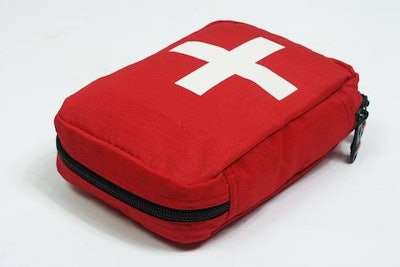
In recognition of National Animal Disaster Preparedness Day on May 9, 2015, Hill’s Pet Nutrition is encouraging pet parents to plan ahead by creating a pet emergency go-kit and following several easy tips to ensure the safety of their pets during a crisis.
“The best thing a family can do in the case of an emergency is be prepared, and that includes having a plan in place for your pets,” said Kostas Kontopanos, president of Hill’s Pet Nutrition North America. “We hope that families take into account some simple steps that will help them feel ready to respond should disaster strike.”
Hill’s recommends building a Pet Emergency Go-Kit in order to cut down on time in the event of a crisis, allowing families to focus solely on getting to safety as quickly as possible.
“Just knowing that a kit is packed and ready to go should eliminate some of the stress during an emergency,” said Dr. Ellen Lowery, director of U.S. Veterinary and Professional Affairs at Hill’s Pet Nutrition. “It will put a family at ease, knowing that everyone, including their beloved pets, will be taken care of.”
The Pet Emergency Go-Kit should include the following:
- Basic first aid supplies
- A three-day supply of bottled water and the pet’s preferred food, held in a waterproof container
- Safety harness and leash
- Waste clean-up supplies
- Medications and a copy of the pet’s medical records
- List of veterinarians and local pet care organizations
- List of the pet’s feeding routine and any behavioral issues
- Comfort items, such as a blanket or favorite toy, to help keep the pet calm and comfortable
Hill’s Pet Nutrition recommends the following additional Tips to Help Ensure Your Pet’s Safety in an Emergency:
- Ensure your pet’s identification by using a microchip or collar ID tag, and make sure that your contact information is up-to-date.
- Display a pet rescue decal on your front door or window to let first responders know there is a pet in the house. Include your veterinarian’s contact information.
- Learn where your pet likes to hide in your house when frightened. Finding your pet quickly will help you evacuate faster.
- Identify a location to take your pet if you need to leave your immediate area. Keep in mind that disaster shelters for people may not be open to pets. Scout hotels and motels with pet-friendly policies and ask relatives or friends if they could house you and your pet.
- Carry a picture of your pet in the event of separation.
- If you need to evacuate, consider taking a pet carrier or crate for transport and safe-keeping.
Hill’s Disaster Relief Network
In the event of an emergency, the Hill’s Disaster Relief Network is positioned to quickly respond and aid impacted areas by supplying pet food to communities hit by disasters. The first-of-its-kind network was established in 2013 as an extension of Hill’s Food, Shelter & Love program, which has donated more than $280 million worth of Hill’s Science Diet brand foods to more than 1,000 shelters in the United States and helped more than eight million pets find new homes.
In the past two years, the Hill’s Disaster Relief Network delivered free food to more than 60 different shelters and veterinary clinics across the country in response to 25 major incidents – including floods in Colorado, fires in Idaho and Arizona, the fertilizer plant explosion in Texas, the mudslide in Washington state and tornadoes in the central and southern regions of the country. In 2015, the Hill’s Disaster Relief Network has already assisted with three incidents – most recently with the March tornado damage in Moore, Oklahoma.
“It’s important for pet owners to know what resources are available to them within their own communities before they’re needed,” said Dr. Gary Weitzman, president and CEO of San Diego Humane Society, which is a member of the Hill’s Disaster Relief Network. “With storm and wild fire season under way, we’re encouraging families to pay close attention to these emergency planning tips so they are better prepared and more confident when having to respond to a disaster. Pets are a part of the family, so it’s just as important to include them in your emergency plan.”


















